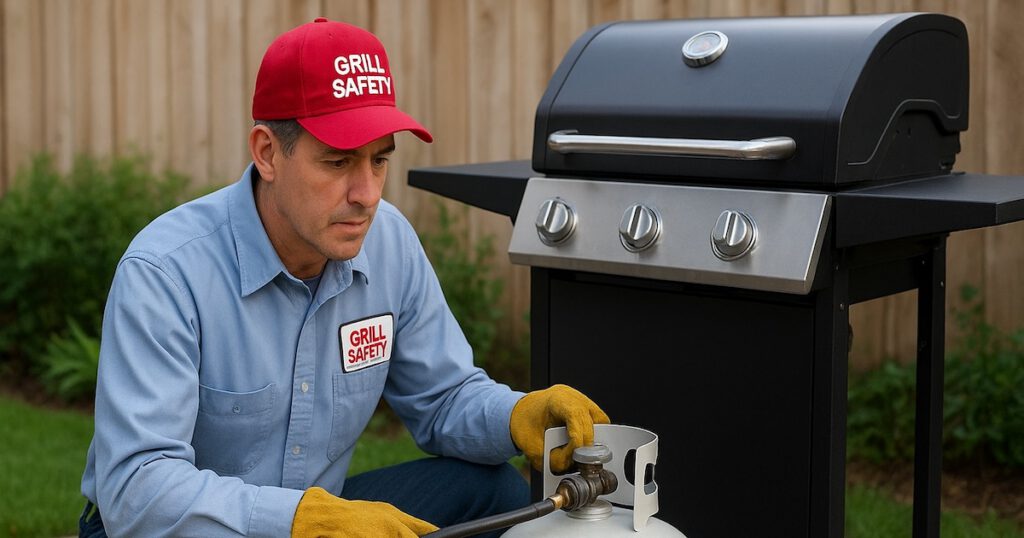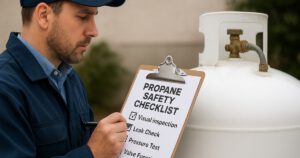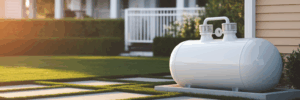
Propane grills offer convenient outdoor cooking, but safe operation requires understanding proper setup, leak detection, and maintenance procedures to prevent accidents and ensure family safety.
With millions of households using propane grills annually, following proven safety guidelines protects against fires, explosions, and health hazards while maximizing your grilling enjoyment.
Why Propane Grill Safety Matters
Propane grills are incredibly popular for outdoor cooking, but they require specific safety precautions due to the flammable nature of propane gas. According to the U.S. Consumer Product Safety Commission, thousands of grill-related accidents occur annually, with many involving propane equipment.
Understanding propane grill safety goes beyond basic operation — it involves proper setup, leak detection, ventilation, and regular maintenance. This comprehensive guide covers everything you need to know to grill safely and confidently.
Essential Propane Grill Safety Rules
Pre-Use Safety Checklist
Always perform this safety check before each grilling session:
- Visual inspection — Check hoses, connections, and burners for damage
- Leak testing — Perform soapy water test on all connections
- Proper positioning — Place grill on stable, level surface away from structures
- Ventilation check — Ensure adequate airflow around grill area
Never skip these pre-use checks, as they take only minutes but can prevent serious accidents.
During Use Safety Guidelines
Maintain constant awareness while grilling:
- Never leave unattended — Stay within sight of lit grill at all times
- Keep children and pets away — Maintain safe distance from grill area
- Use long-handled tools — Prevent burns from flare-ups
- Have fire extinguisher ready — Keep ABC-type extinguisher nearby
Proper Propane Grill Setup and Location
Location Requirements
Strategic placement prevents accidents and ensures safety:
✅ Safe Grill Locations
- Well-ventilated outdoor areas with good airflow
- Stable, level surfaces (patios, decks, or grass)
- At least 10 feet from structures, fences, or flammable materials
- Areas protected from wind that could affect flame control
❌ Dangerous Grill Locations
- Under low-hanging branches or overhangs
- Near windows, doors, or air conditioning units
- Inside garages, tents, or enclosed spaces
- Close to gasoline or other flammable liquids
Grill Stability and Clearance
Proper setup prevents tipping and ensures safety:
- Level surface — Use bubble level to ensure grill sits flat
- Wheel locks — Engage all locking mechanisms on mobile grills
- Heat clearance — Maintain 3 feet clearance from combustible materials
- Ground contact — Ensure all wheels touch ground for stability
Propane Cylinder Safety and Handling
Cylinder Storage Guidelines
Proper cylinder storage prevents accidents:
Approved Storage Locations
- Upright position on stable surfaces
- Well-ventilated outdoor areas
- Away from direct sunlight and heat sources
- Protected from weather damage
Prohibited Storage Areas
- Inside homes, garages, or sheds
- Near furnaces, water heaters, or electrical equipment
- In areas where cylinders could be knocked over
- Close to swimming pools or spas
Cylinder Inspection and Maintenance
Regular cylinder checks ensure safe operation:
- Visual inspection — Check for dents, damage, or rust monthly
- Valve operation — Ensure valves turn smoothly without sticking
- Hose condition — Look for cracks, kinks, or brittleness
- Leak testing — Test connections with soapy water before each use
Leak Detection and Emergency Response
How to Test for Propane Leaks
The soapy water test is the most reliable leak detection method:
- Mix solution — Combine dish soap with water in spray bottle
- Apply to connections — Spray soapy water on valves, hoses, and fittings
- Look for bubbles — Bubbling indicates gas escaping from leaks
- Test when pressurized — Open cylinder valve and check all connections
Always test for leaks outdoors in well-ventilated areas, never indoors or near open flames.
Recognizing Propane Gas
Propane has a distinct odor for safety detection:
- Rotten egg smell — Mercaptan odorant added for leak detection
- Hissing sounds — Audible gas escaping from leaks
- Frost or ice — Cold areas where gas is rapidly expanding
- Dirt blowing — Soil particles moved by escaping gas
Emergency Response Procedures
If you suspect a propane leak:
- Extinguish flames — Put out all open flames and smoking materials
- Shut off gas — Close cylinder valve if safely possible
- Evacuate area — Move everyone to fresh air immediately
- Call professionals — Contact propane supplier and fire department
Do not use electrical switches, phones, or light matches in the area of a suspected leak.
Proper Lighting and Shutdown Procedures
Safe Grill Lighting Steps
Follow these steps for safe grill ignition:
- Open lid — Ensure grill lid is open before lighting
- Check gas flow — Open burner valves and cylinder valve
- Use long match or lighter — Keep hands and face away from grill
- Light burners individually — Start with burners farthest from cylinder
Never use gasoline or other flammable liquids to light your grill, as this creates explosion hazards.
Proper Shutdown Procedure
Safe shutdown prevents accidents:
- Turn off burners — Close all burner control valves
- Close cylinder valve — Shut off gas supply at cylinder
- Disconnect if needed — Remove cylinder only if grill will be stored
- Allow cooling — Let grill cool completely before moving or covering
Ventilation and CO Safety
Carbon Monoxide Awareness
Proper ventilation prevents carbon monoxide buildup:
- Outdoor use only — Never use propane grills indoors or in enclosed spaces
- Wind direction — Position grill so wind blows fumes away from people
- Ventilation requirements — Grill in open areas with good air circulation
- CO detector proximity — Avoid grilling near CO detectors (may cause false alarms)
Weather-Related Safety
Weather conditions affect grill safety:
- Wind considerations — High winds can cause flare-ups and uneven heating
- Rain precautions — Keep grill dry to prevent gas valve issues
- Temperature effects — Extreme cold may affect gas pressure and flow
- Lightning safety — Unplug electric starters during thunderstorms
Propane Grill Maintenance and Inspection
Regular Maintenance Schedule
Consistent maintenance extends grill life and ensures safety:
Before Each Use
- Inspect burners and orifice ports for blockages
- Clean grease and debris from grill surfaces
- Test for gas leaks using soapy water
- Ensure all connections are tight and secure
Monthly Maintenance
- Deep clean burners and grill grates
- Check hose for cracks, kinks, or damage
- Inspect regulator for proper function
- Clean grease traps and collection areas
Seasonal Maintenance
- Replace worn hoses and gaskets
- Have regulator professionally tested
- Store cylinder properly during off-season
- Clean and protect grill from weather damage
Common Maintenance Issues
Address these problems immediately:
- Yellow flame — Indicates incomplete combustion, clean burners
- Irregular flame — Check for blocked orifice ports
- Gas odor when lighting — Possible leak, stop using immediately
- Difficulty lighting — Clean burners and check gas flow
Child and Pet Safety Around Grills
Creating Safe Zones
Establish clear safety boundaries:
- 3-foot safety zone — Keep children and pets at least 3 feet from hot grill
- Supervision required — Adult supervision mandatory when grill is in use
- Safe play areas — Designate areas away from grill for children and pets
- Hot surface warnings — Clearly mark grill as hot when in use
Teaching Safe Behavior
Educate family members about grill safety:
- Never touch hot surfaces — Explain burn hazards to children
- Stay clear of flames — Teach about clothing ignition risks
- Report problems — Encourage reporting unusual smells or sounds
- Wait for cooling — Emphasize that grills stay hot after use
Propane Grill Safety for Different Types
Built-in Grill Safety
Island and built-in grills require specific precautions:
- Professional installation — Must be installed by licensed professionals
- Gas line safety — Proper gas line installation and testing
- Ventilation requirements — Adequate airflow around installation
- Shut-off valve access — Emergency shut-off must be easily accessible
Portable Grill Safety
Mobile grills need additional stability measures:
- Wheel locks — Always engage locking mechanisms
- Transport safety — Secure grill during movement
- Storage position — Store upright to prevent tipping
- Wind resistance — Position to minimize wind effects
Smoker and Grill Combinations
Combination units require extra care:
- Temperature monitoring — Use thermometers to monitor cooking temperatures
- Extended cooking times — Never leave unattended during long cooks
- Wood pellet safety — Store pellets away from heat sources
- Ash disposal — Handle hot ashes carefully
Legal and Regulatory Compliance
Local Regulations
Grill usage may be regulated in some areas:
- City ordinances — Check local grilling restrictions
- Homeowners associations — Review HOA rules for outdoor grilling
- Fire restrictions — Follow burn bans and fire danger alerts
- Permitting requirements — Some areas require permits for built-in grills
Safety Standards
Propane grills must meet national standards:
- ANSI certification — American National Standards Institute approval
- CSA certification — Canadian Standards Association compliance
- NFPA guidelines — National Fire Protection Association standards
- DOT cylinder approval — Department of Transportation certification
Common Propane Grill Safety Mistakes
Frequent Errors to Avoid
These common mistakes lead to accidents:
- Indoor use — Never grill indoors, even in garages
- Flammable liquids — Don’t use gasoline or other accelerants
- Overloading grill — Don’t exceed recommended capacity
- Poor positioning — Keep away from structures and wind
Maintenance Neglect
Skipping maintenance creates hazards:
- Ignoring leaks — Address all gas leaks immediately
- Old hoses — Replace hoses every 2-3 years
- Blocked burners — Clean burners regularly for proper flame
- Rusty components — Replace damaged parts promptly
Emergency Preparedness
Grill Safety Kit
Keep these items near your grill:
- ABC fire extinguisher — Rated for grease and electrical fires
- Long-handled tools — Tongs, spatulas, and grill brushes
- Leak detection spray — Soapy water solution for testing
- First aid kit — For burns and minor injuries
Emergency Contact Information
Keep these numbers readily available:
- Local fire department — Emergency response number
- Propane supplier — 24/7 emergency contact
- Poison control — For gas exposure incidents
- Local emergency services — Non-emergency contact
Seasonal Grill Safety Tips
Summer Grilling Safety
Peak season requires extra vigilance:
- Heat management — Monitor temperatures in hot weather
- Hydration — Stay hydrated during extended grilling
- Sun protection — Use sunscreen and protective clothing
- Food safety — Prevent bacterial growth in warm temperatures
Winter Grilling Considerations
Cold weather affects grill performance:
- Gas pressure — Cold reduces propane pressure and flow
- Lighting difficulties — May need backup ignition methods
- Frost prevention — Protect regulators from freezing
- Wind protection — Shield grill from cold winds
Professional Grill Services
When to Call Professionals
Some issues require expert attention:
- Gas line installation — Professional installation required
- Major repairs — Complex component replacement
- Annual inspection — Professional safety check recommended
- Performance issues — Troubleshooting complex problems
Choosing Service Providers
Select qualified grill service professionals:
- Certified technicians — Propane or appliance certification
- Insured and licensed — Proper business credentials
- References available — Check customer reviews
- Transparent pricing — Clear pricing without hidden fees
Final Safety Recommendations
Propane grill safety combines knowledge, preparation, and consistent practices. By following these guidelines, you can enjoy outdoor cooking while minimizing risks to your family and property.
Remember that grill safety is everyone’s responsibility — from initial setup to final cleanup. Regular maintenance, proper storage, and emergency preparedness create a safe grilling environment.
Make propane grill safety a priority by conducting regular inspections, following proper procedures, and staying informed about potential hazards. Safe grilling means better cooking and peace of mind.
Ready to grill safely? Start with a thorough inspection of your equipment and review these safety guidelines before your next outdoor cooking session.
Additional Resources
Learn more about propane grill safety:
- National Fire Protection Association (NFPA) — Grill safety guidelines
- U.S. Consumer Product Safety Commission — Product safety information
- Propane Education & Research Council — Propane safety resources
- American National Standards Institute (ANSI) — Safety standards information
Always consult manufacturer instructions and local authorities for specific safety requirements in your area.
About Jennifer Whitaker
Propane industry expert and content contributor for MyPropane.com.
View all posts by Jennifer Whitaker →Related Articles

Essential Propane Safety Guide
Sep 17, 2025 • 6 min read
Learn essential propane safety tips, proper storage guidelines, leak detection, and emergency procedures to keep your family safe while using…

Ensuring Propane Tank Safety and Longevity
Oct 3, 2025 • 7 min read
Follow this comprehensive checklist to ensure your home's propane system remains safe, efficient, and reliable for years to come.